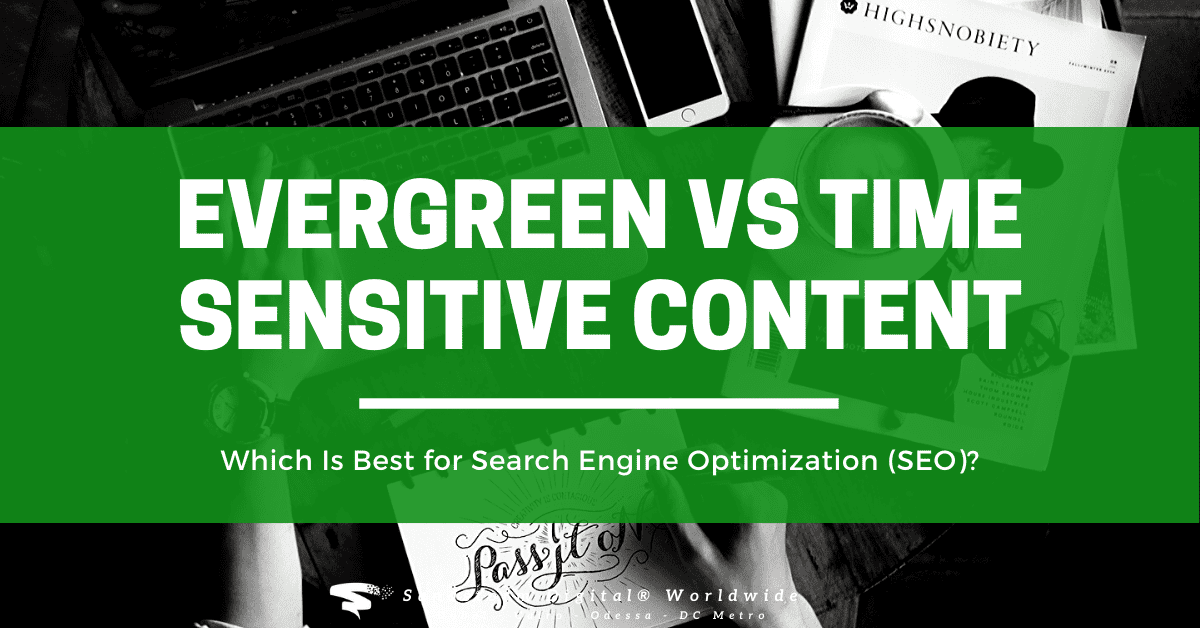In the realm of search engine optimization (SEO), the adage “content is king” rings true. You can build an attractive and functional website, but unless it has high-quality content, it won’t perform well on Google and Bing. Not all content is the same, however. Website content is often classified as either evergreen or time-sensitive, depending on the length of time for which it remains relevant.
What Is Time-Sensitive Content?
Also known as topical or timely content, time-sensitive content is characterized by a short period of relevancy. In other words, it’s only valuable to visitors for a short period.
Some types of time-sensitive content are relevant for a few months, whereas others are only relevant for a few days. An article about home heating tips, for instance, will likely remain relevant throughout the winter season. In comparison, an article about a local event may only be relevant for a few days. Regardless, all types of time-sensitive content have a metaphorical expiration. Once a piece of time-sensitive content has reached its metaphorical expiration date, it ceases to offer value to visitors.
What Is Evergreen Content?
Evergreen content, on the other hand, is characterized by an infinite or long period of relevancy. Unlike time-sensitive content, it remains relevant long after being published.
How long does evergreen content stay relevant exactly? While there’s no universally recognized expiration date for it, most SEO experts agree that any type of content which holds its relevance for at least several years is evergreen. Some pieces of evergreen content, in fact, never love their relevancy. Once published, they offer meaningful value to visitors indefinitely.
Common types of evergreen content include:
• How-to guides
• Expert interviews
• Case studies
• Checklists
• Curated lists
• Product reviews
• Glossary of relevant terms
• Frequently asked questions
• Comparison articles, such as this article
Benefits of Time-Sensitive Content
There’s typically less competition for time-sensitive content than evergreen content. Since it’s only relevant for a short period, fewer businesses publish time-sensitive content on their websites. And with less competition, time-sensitive content is oftentimes easier to rank than evergreen content.
Time-sensitive content can drive a substantial amount of traffic to your website. During the period for which it’s relevant, time-sensitive content will attract visitors who actively search for it on Google, Bing and other search engines. As these visitors flood your website, you’ll probably generate more sales or conversions.
Another benefit of publishing time-sensitive content on your website is increased visitor engagement. When visitors encounter a piece of time-sensitive content with a short, fixed expiration date, they’ll recognize it as being highly relevant. Therefore, visitors may interact with your website by clicking links, completing lead forms or purchasing a product.
If you’re hoping to earn a placement in Google News or Bing News, you’ll need to publish time-sensitive content on your website. As news aggregators, Google News and Bing News generally don’t show evergreen content. Instead, they show time-sensitive content, such as news articles, that are only relevant for a short period. Google News and Bing News rarely display evergreen content, so you’ll need to create time-sensitive to rank in the search engines’ news aggregators.
Benefits of Evergreen Content
Evergreen content can benefit your website as well. With its long period of relevancy, it will likely drive more traffic to your website, over time, than time-sensitive content. As long as it’s valuable to your website’s visitors, it will attract them to your site.
Although there’s more competition for it, evergreen content ranks well in the search results. Seasoned webmasters realize that evergreen content offers long-term value, so they’ll often link to it. If another webmaster believes a piece of evergreen content on your website is relevant and valuable to his or her visitors, the webmaster may link to it. As other webmasters link to your website’s evergreen content, search engines may rank it higher in the search results.
You can usually repurpose evergreen content on your website for use in other digital marketing activities. If you have a long-form evergreen article that’s filled with interesting statistics, for instance, you can pull information from it to use in an infographic. Alternatively, you can convert the evergreen article into a video. Repurposing time-sensitive content is more difficult and, in many cases, a waste of time since it becomes irrelevant shortly after being published.
Finally, you can create evergreen content in bulk. There are typically fewer topics available for time-sensitive content, so you can usually only create one or a few pieces at a time. Regarding evergreen content, though, topics are limitless. You can churn out dozens of pieces of evergreen content at once, after which you can schedule them to publish at various intervals on your website.
Choosing Between Evergreen and Time-Sensitive Content
Considering that they both offer unique benefits, you might be wondering whether to create evergreen or time-sensitive content for your website. Rather than restricting your website to just one type of content, you should consider using both.
If you only create time-sensitive content, your website will experience a sharp decline in traffic. The only way to maintain traffic is to constantly publish new pieces of time-sensitive content, which can be time-consuming. Furthermore, relying entirely on time-sensitive content for your website’s content marketing strategy will prevent your site from ranking in Google News and Bing News.
You can take advantage of evergreen and time-sensitive content by publishing both types on your website. Don’t just create a 50-50 mixture, though. For every piece of time-sensitive content you create, you should create at least four pieces of evergreen content. Maintaining a high ratio of evergreen to time-sensitive content packs the greatest SEO punch by driving the most traffic to your website for the least amount of work.
High-quality content is the foundation on which all successful websites are built. It can instantly transform an otherwise dull and valueless website into an authoritative resource of information. Whether you create evergreen content, time-sensitive content or a combination thereof, you must emphasize quality over quantity.











